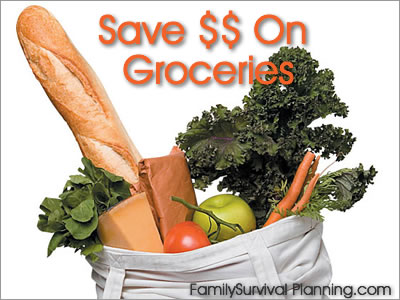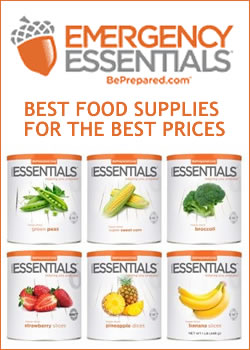- HOME
- Financial Survival
- Save Money on Groceries
5 Ways to Save Money
on Groceries...And It's
Not About Couponing

We all know that food is expensive and getting more so all the time. So to save money on groceries, we need just a bit of planning and a lot of awareness.
Couponing can be a great savings on certain items. The key is to find coupons for products that your family actually uses and prefers. I have found that most (not all) coupons are for processed foods, which I rarely buy. So couponing is a small part of my grocery savings.
Invest in emergency food storage now and enjoy peace of mind for the next 25 years. Don't miss out on the savings!
I find that the most important step in controlling my grocery budget is to become familiar with regular prices in order to recognize a good bargain when I see one. Knowing regular prices allows you to know if the sale price is a good bargain or just has a sign on it claiming it's marked down (yes, they do that to entice buyers).
Here's how to get started:
- Create a comparison price sheet
- Stockpile
- Buy in bulk
- Best places to shop
- Grow your own
1. Create a Simple Price Sheet
Begin by creating a price sheet with columns in which you will record items, dates, and prices. Next, list 10-50 items that you consistently use. These things should come easily to your mind: bread, milk, oranges, cornflakes, chicken, toothpaste - these types of things. (This price sheet might be a repeat of your regular grocery shopping list.)
For example:
|
Food Item |
Date |
Price |
| Bread | ||
| Milk | ||
| Oranges | ||
| Chicken |
Over the next several weeks, jot down the price of each of these items whenever you see one in the ads or in the stores, even though you may not be buying it at that time.
You may have to devote several hours to creating your price sheet by visiting several different stores. Jot down the various prices on the different brands for the 40 or 50 items you use most. Though prices may fluctuate, you will soon recognize a normal price range for each item.
Use comparison shopping to check prices in the grocery ads and compare prices on different brands of the same item any time you're at the store.
Bargain shopping means that you only stock up when an item is on sale at a good price. Then when that item returns to full price, you needn't buy it again - you will already have a supply on hand.
2. Stockpile Favorite Menu Items
Stockpile the food your family is used to eating and this will, in the long run, save money on groceries.
Stocking up on sale items you use consistently is crucial to filling your own "grocery store" in your pantry or basement. This may take several months unless you have the money to do it all at once. Few of us do, so use comparison shopping to buy only enough regularly priced "needs" to get by until you see a sale on the products you regularly use — then stock up by buying as many as you can afford.
For some people, "stocking up" means bringing home a case or two of canned goods every shopping trip. For others, it means buying four cans of soup instead of one. Some people may stock up with bulk buys; a 100 pounds of oats or 50 pounds of dry milk. Others have stocked up by buying a 25-pound bag of flour instead of a 5-pound bag. Just figuring out what will work for you and be consistent.
Other ways to save? Try Penny-Pinching For Food Storage.
3. Buy in Bulk
Buying products in bulk will save a substantial amount of money in the long run. Shopping at farmers markets and co-ops can provide bulk shopping, giving you more for your money. I belong to a co-op (free to join), Bountiful Baskets, which specializes in buying bulk foods fresh from the farm, usually all organic.
Buying freeze-dried and dehydrated foods in 5-6 gallon buckets saves money over #10 cans or pouches. Foods that come in these kinds of buckets typically will last a long time even if you choose to open them and use the ingredients in your daily menus. We usually have unsealed buckets of oats and pinto beans in our cool storage and dip into them as needed over a year or more.
4. Find the Best Places to Shop
In addition to traditional supermarkets, there are many other outlets that sell groceries. For the greatest buying power, you should consider membership clubs such as Sam's Club and Costco, mass merchandisers, day-old bread outlets, dollar stores, small ethnic specialty shops, farmers markets, and co-ops.
Many times they offer traditional supermarket items - paper goods, health and beauty products, detergents, soaps, canned goods, and so on, at significantly lower prices than you would pay for the same items in a grocery store.
Or join Amazon Prime and Amazon Prime Pantry and buy these kinds of products at lower prices AND no shipping. I have found my Prime membership has more than paid for itself by saving shipping charges.
5. Grow Your Own Food
The most cost effective method of saving money on groceries (also the most nutritious) is to grow your own produce. (You knew I was going to bring this up, didn't you?) Any fruit or vegetables you can grow yourself will save you thousands of dollars over the life of your garden. Raising chickens, ducks, rabbits or goats will save even more. It's all a matter of committing to doing the work of planting, weeding, harvesting, and preserving the food.
What do you think?
I’d love to hear what you have to say in the comments.















